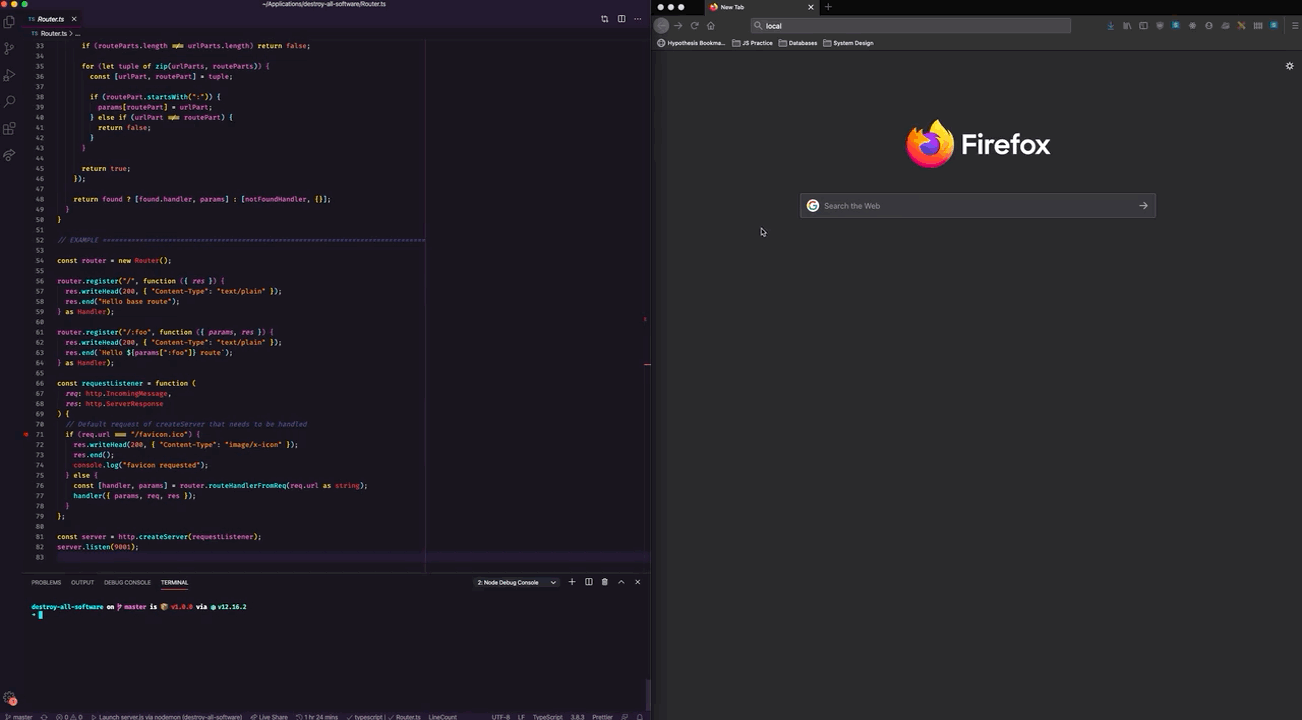speculative nonfiction
Debugging TS in VSCode and Russel Ackhoff's Problem Treatments
When I’m drifting between jobs – say, during a global pandemic and massive civil rights upheaval – I tease away some time from protest and anti-racist organizing to study programming basics and plunge below the membranes of web frameworks. Of course, the first thing you realize after a few key clacks is the brutal lack of a full-featured dev environment. I think my industry folks who don’t spend free time on side projects can relate.
I had a serious moment of angst this morning about whether I could achieve debugging for TypeScript files in VSCode within a reasonable amount of time – that is, an amount of time that wouldn’t deplete all my creative energy before writing any code. To my very pleasant surprise this was much easier than expected. You need two things.
- Add a task to run the compiler in watch mode (this is totally boilerplate):
{
"version": "2.0.0",
"tasks": [
{
"type": "typescript",
"tsconfig": "tsconfig.json",
"option": "watch",
"problemMatcher": ["$tsc-watch"],
"group": "build",
"label": "tsc: watch - tsconfig.json"
}
]
}
- Add your outfiles (dist) target glob to your launch.json file:
{
// Use IntelliSense to learn about possible attributes.
// Hover to view descriptions of existing attributes.
// For more information, visit: https://go.microsoft.com/fwlink/?linkid=830387
"version": "0.2.0",
"configurations": [
{
"name": "Launch server.js via nodemon",
"type": "node",
"request": "launch",
"runtimeExecutable": "nodemon",
"program": "${file}",
"restart": true,
"console": "integratedTerminal",
"internalConsoleOptions": "neverOpen",
"runtimeArgs": ["--experimental-modules"],
"outFiles": ["${workspaceFolder}/out/**/*.js"] // <-- ADD YOUR OUTFILES GLOB HERE
}
]
}
And voila, pausing on breakpoint in a basic router I wrote while running a node server:

Ok new topic…
During episode 138 of the > Code podcast with guest Vaidehi Joshi (of BaseCS podcast fame amongst many other things), the discussion veers into the topic of problem solving (~20:30). Jamey and Vaidehi riff about that condition we all know and love – and never appreciate enough – whereby solutions come to you while away from the computer; while your brain is “percolating” (Jamey) or in a “mental marinade” (Vaidehi). Jacob Stoebel expands on that by describing another common mental turnabout we programmers do: where we often catch ourselves down a rabbit hole trying to – big “S” – solve the problem with our first instinct; but that increasingly deeper and muddier slog causes us to pause and shake off the adrenaline and climb back out of the hole and we find ourselves asking oursleves how do I get rid of this problem. Rein, per usual, picks up the thread and introduces the panel/listeners to a theorist named Russell Ackoff who minted a classification for approaches to problems called “Problem Treatments.”
To list and paraphrase them:
-
Absolution - Ignore the problem and hope it goes away
It’s easy to joke about this one, but Rein actually provided a compelling case for this. For example, security engineers often make the tradeoff to ignore a security loophole if the threat isn’t great enough.
-
Resolution - Doing something something “good enough”
This feels like a pretty standard principle for building product considering some of the typical aspects of commercial software work:
a) Your team will never have a complete understanding of how your software will express itself once “running” or “used” by customers. Therefore perfection, completeness, wholeness are not desirable or ever, actually, achievable.b) Deadlines and other external stakeholder pressures will force you to sacrifice however your team defines “great” or “better” software
-
Solution - Finding an optimal solution with experimentation or research
There are touchstone moments in the development of software where this happens. When choosing a framework. When designing a styleguide. When choosing a caching strategy. When designing a game plan to migrate code.
-
Dissolution - Redesigning the system so that the problem no longer exists
This is what Jacob was hinting at. That pure land you inhabit when refactoring code to circumvent an immediate impasse in the software by reframing the problem. I fondly remember dissolving a particularly tricky conditional statement in a web client by working with a backend engineer to implement an enum for a resource type. This removed a bunch of object introspection (Law of Demeter violations, etc…) in favor of a simple switch statement.
Tuesday June 16, 2020